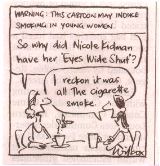 |
Non Smokers' Update |
Contact: Send a message to the NSMA
Web page: www.nsma.org.au
CITY RAIL REFUSES TO CONFRONT SMOKERS ON PLATFORMS
In spite of sustained pressure from NSMA members for over two years including 130 personally addressed complaints to Members of NSW State Parliament, the Minister for Transport, The Hon. Carl Scully continues to preside over "Claytons No Smoking laws" on the City Rail network. The most disgraceful aspect of his administration is their determination to keep pumping out assurances that the laws are enforced and that staff do their jobs properly, when it is perfectly obvious to everyone that breaches of the smoking bans on platforms occur every hour of every day in every week in the year.
Take the situation at one western line station where complaints have been regularly lodged. Twelve months ago the station Manager refused to come out of his office to speak to smokers breaking the law. We are led to believe he was disciplined and assurances were given in writing by the Parliamentary Secretary for Transport, Kevin Moss, that staff at Seven Hills have been instructed how to respond in any future situation. We took this to mean they would do the right thing next time.
In December 2001 this was put to the test with another request to the same station manager to come out of his office and speak to a man smoking under the covered area in breach of the law. He again refused to attend to the request but this time he was prepared with a whole new line of excuses. He said that City Rail now has a "Non Confrontationist Policy" and he could lose his job if he intervened. Pressed for an explanation of this amazing policy he said the Unions and Management have agreed that staff should not put themselves at "risk" by confronting smoking passengers because they might turn nasty.
Can you believe this nonsense? It is clear that the staff and the unions are running City Rail while the Minister and Transport Secretary conduct a cynical "snow job" in a vain attempt to pretend there is no problem with smoking on platforms. The member who complained at Seven hills was so disgusted with this repudiation of written statements from Kevin Moss that he demanded that an Inspector travel with him to Seven Hills to see first hand that this Station Manager was told in no uncertain terms that his actions were directly opposite to what Transport Secretary, Kevin Moss, was telling everyone, including Members of Parliament.
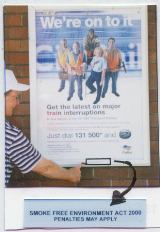
Pathetically small no-smoking signs on Seven Hills railway station
However, he was then informed by the Western Area Manager, Wayne Rowe, that this would not be possible because the unions had another agreement with management that when complaints were made against a staff member he or she must not be disciplined in the presence of the complainant. This will not be news to anyone who has been stubborn enough to try to follow through on a complaint. It is such a mind numbing experience that you inevitably give up and walk away shaking your head.
Revenue Protection Officers (RPOs) There are two key elements to this problem. One is that ordinary staff do not want to know about the problem, partly because many of them are smokers anyway, but mostly because of a high sense of job demarcation; "it is not my job". The second is that only the RPO's are empowered to issues fines for smoking. Where can you find an RPO on an ordinary suburban railway station when you need one? Of course the answer is - NEVER! The result is not only NO ENFORCEMENT - there is not even a feasible mechanism for enforcement. Hence there is no possibility of corrective action unless radical changes are made in policy and administration within City Rail.
Revenue Opportunity Wasted The page 2 story in the Sydney Daily Telegraph on 7 January 2002 criticised City Rail management for proposing to downgrade RPOs who issued less than four fare evasion fines per day, saying that is sub-standard performance. No mention was made of the very relevant fact that RPOs are the only staff that could raise millions in smoking fines if they were instructed to do that job with the same priority as fare evasion. The truth is that RPOs staff have told NSMA members many times, that they do not regard issuing smoking fines as a primary part of their job. In any event their policy is always to warn and never to fine on the first offence.

Media Complaints about Revenue Protection Officers (RPOs)
They always fine on the first offence for fare evasion for the very good reason that they can never tell whether it is first offence or not. Unless they made an identification record when issuing warnings for either smoking or fare evasion, how would they know? The Minister is guilty of wasting a very obvious revenue raising opportunity by refusing to confront and fine smokers.
No Security on City Rail Platforms The recent incident of a woman being raped on a Sydney Railway station while in full view of a security camera for 15 minutes just proves how hopeless the present division of job responsibility is within the railway administration. This tragedy was widely reported in the media on 9 January 2002 and indicated that station staff in the ticket office were "unaware" while it was happening under their noses. City Rail has outsourced their security operations to contractors and a very small number of Transit Police who are rarely seen by the public.
Other staff have a "bunker mentality"; they won't come out of their offices, they won't give their names, they won't confront anyone breaking the law because it might put them at risk. They know they have a boiler-plate protection against criticism because their union has struck deals with City Rail management not to discipline them. Policy Confusion Throughout this campaign we have formally and consistently asked the Minister to end the confusion caused by bans which apply only in covered areas and not in uncovered areas of platforms. On 30 January 2001 we wrote as follows:
"Will the Minister consider bringing in a total ban on smoking anywhere on SRA property? This will avoid the definitional problems of "covered areas" referred to in the regulations. This can easily be justified on the grounds that people are limited to a confined space where they are often crowded together, particularly on entry and exit to trains. It is common practice for smokers to smoke right up to entry point and throw their lighted butts under the carriage as they step on board.
It is also common practice for smokers to light up immediately on stepping off trains and thereby inflicting their pollution on passengers crowded into the covered walkways and exit stairways. If smoking can be banned at a football stadium because people are confined and have no escape, why not apply the same standard to public transport?"
The Minister never bothered to reply directly. He simply passed it on to Kevin Moss who churned out one more of his famous word processor replies stating:
"The Railway Offences Act 1994 states that a person must not smoke on any enclosed (or otherwise covered) SRA premises. This regulation is applicable to both commuters and SRA staff. City rail stations have signage indicating the smoking ban, and announcements are made to this effect. Revenue Protection Officers are empowered to issue infringement notices for contravention of this regulation, with a $200 penalty. The City rail website, www.cityrail.nsw.gov.au, also makes this clear. Additionally, the Transport Infoline on 131 500 is available to receive customer feedback. The NSW Government remains committed to public health issues, such as smoking on railway property. Thank you for writing to me on this issue."
In the office we now have enough copies of such replies to wallpaper the whole office. But out there on the railway stations they are still smoking at will. The smokers have more chance of winning lotto than being fined the $200 which City rail say they so desperately need.!
Improved Signage is a Joke! For 24 years we have been telling City Rail and SRA that a critical problem with passenger education is the lack of proper NO SMOKING signage on platforms. Whenever you try to tell smokers about the bans they immediately say; "Where are the signs - show me the signs". The photo on page one shows the very latest signage put up on platforms over the last several months. I'm sure we are all very grateful that a person with average eyesight can actually read the words from a distance of 1.6 metres. You will note that Kevin Moss's letter above is quick to state; "City Rail stations have signage indicating the smoking ban". WHAT A JOKE. It would be laughable, if it were not such a serious matter for the health of the travelling public.
Further strong Action needed The pressure is really building up through these lies and half-truths from the Minister's office. He has his head firmly in the sand and vainly hopes that slow learner, Kevin Moss, will eventually get it right. Something will have to give in the near future. Some NSMA activists are proposing that we really should invoke citizens arrest procedures to physically remove smokers from the platforms, or perhaps extinguish them with a bucket of water. This might really bring the matter in for the media attention it deserves. Some front-page media in an election year might finally force some corrective action from the Minister. Once again it will be government action by media pressure, not by good ministerial administration.
Action Point 1. Write to Mr Kevin Moss, "Alice in Wonderland Dept.", Parliament House, Macquarie Street Sydney, 2000. Tell him that from your personal observations the no-smoking laws are not enforced on railway stations. Tell him that you will keep the continuing failure of the Carr Labor Government in mind as you prepare to vote in the approaching NSW state election.
Action Point 2. (Only if you have time to waste) Ring the NSW Transport Infoline on 131 500 and register a complaint every time you see someone smoking on railway stations. If you would like to receive your own personally signed copy of Kevin Moss's famous letter, ask to be informed of the outcome of your complaint. Perhaps you could then send it into the office; we still have a bit more space on the toilet walls.
NSMA Says Thank You to Marlene Sharp
A very successful dinner in honour of Mrs Marlene Sharp was held at the Furama Central Hotel in Sydney on 28 November 2001. You will recall (Update No. 35) that Marlene was the courageous lady who, in spite of her illness with cancer, decided to put herself through the gruelling fight to vindicate her belief that her cancer had been caused by 22 years of exposure to other peoples' cigarette smoke while working in hotels and clubs in Port Kembla NSW. She was never a smoker and she was awarded $466,000 in a world first "passive smoking causes cancer" court decision. Over seventy members attended the dinner and were treated to a very gripping first hand account of the cut and thrust of the legal battle by senior barrister, Peter Semmler QC.
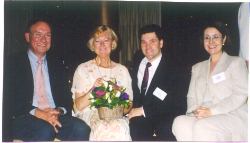
The Winning team at the dinner on 28th Nov 2001.
Left to right - Peter Semler, Marlene Sharp, Michael Heath,
Miki Milicevic.
Marlene and husband, Bill, together with the legal team of solicitor Ms Miki Milicevic and junior counsel, Michael Heath, were all invited as guests of NSMA. We though it appropriate to say thank you for their personal commitment and contribution to a magnificent win on behalf of all of us who will eventually reap the benefits.
Third World War Peter Semmler was guest speaker after the dinner and he kept the audience fascinated as he described the battle to win this vitally important case. He said the defence was conducted with all the fury and determination of world war three. They made many applications at the outset to have the case side-tracked on various technical grounds, but the team adequately answered all attempts.
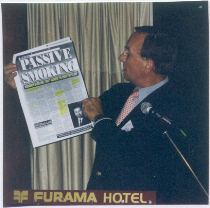
Peter Semmler, QC, shows clubs
had full information about passive smoking dangers.
The defendants comprising the Port Kembla RSL, backed by the NSW WorkCover Authority, spent up to $3 million to stop Marlene winning $466,000 in damages. It would have been cheaper to pay her off on the courthouse steps, but they realised the critical significance of stopping a court precedent, which would have across-the-board influence on other hospitality workplaces and open the floodgates for other claims.
The tobacco industry lawyers, Clayton Utz, kept feeding information to the defendants and made no attempt to hide their interest by having their lawyers in the court for every day of the eight week marathon trial. They brought in expert witnesses from New Zealand and from the USA to testify that no one had really proved the connection between passive smoking and cancer. However, Peter's legal team had only to convince the court that there was a "foreseeable risk" of contracting any one of a significant list of diseases, including cancer, as a result of long-term exposure to passive smoking in her workplace. Proving that foreseeable risk established the negligence aspect leading to the damages award. Peter acknowledged the value of lead up work provided by barrister Neil Francey, in earlier successful milestone tobacco litigation cases for AFCO and also in the case of the late Sue Meeuwissen vs the Sydney Hilton Hotel.
Liesel Scholem's case helped He also pointed to the pioneering work done by his previous team on Liesel Scholem's first-ever-win on workplace ETS causing her illness. That was also a "world first" and led directly to the great step forward with bans on smoking in the workplace in Australia. It was also a great help in running this case. He pointed to the excellence of the Australian medical witnesses who gave evidence supporting Marlene's case that finally won the day over the tainted imported evidence. Peter thanked the spouses and families of the legal team because such a hard fought case required very understanding and supportive families. He made several statements that will give all members of NSMA re-assurance that we are playing a vitally important role in fostering and supporting these types of legal actions.
Firstly, he said that cases like Liesel Scholem and Marlene Sharp bring about major social changes, which will not be achieved through Parliament alone, because it needs the financial penalties, which these cases apply to the commercial interests to bring about change. Secondly, he predicted that looking back in 100 years time, people will say the these cases were inevitable milestones in the progress towards a society where smoking is restricted to the privacy of smoker's own homes.
Thanks To Lawyers NSMA member, Professor Dennis Turner, proposed a vote of thanks to the legal team. On our behalf, he expressed sincere appreciation of Peter and his team taking time out of their busy lives to come along and talk to us about this important case. The details were fascinating and he drew a laugh when he said he did not realise the importance of "blue billiard balls". This referred to some of the evidence which said the club was so smoke-filled at times that players could not see the blue coloured balls!
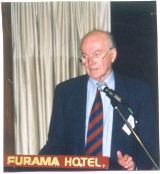
Professor Dennis Turner thanks Peter and his legal team.
He thanked the legal team for their social conscience in taking on what others saw as risky and uncertain litigation. The case would never have reached the courts without their wonderful agreement to take the case on a "no win - no fee" basis. Finally he thanked them for their dedication and professionalism in doing the enormous amount of work required to win this pioneering case against the odds and thus bring about a great benefit to the whole community.
A Big Team Effort Anne Jones, CEO of ASH Australia, acknowledged that the local health lobby worked together to provide the very best and latest information to the lawyers to assist the case preparation. The scene is now set to use this verdict as vital leverage to force an end to passive smoking pollution in all hotels, clubs and casinos, which are still putting their staff at risk.
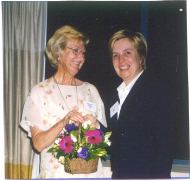
Anne Jones, CEO ASH Australia, congratulates Marlene Sharp
On another note she said that new initiatives, such as the attempt to get the Independent Commission on Crime and Corruption (ICCC) to conduct an inquiry into the tobacco industry in Australia, had not been successful. However she said that the success of cases like Marlene' gives everyone great encouragement to keep the fight going. On behalf of all present she presented Marlene with a nice bouquet of flowers.
Marlene Tells of Lost Friends The audience was moved by Marlene's sincere thanks to all who had supported her and to NSMA's contribution including this much appreciated dinner to acknowledge her efforts. Where would we be without members like you, she asked?. She spoke of the tension and distress caused amongst long term friends and colleagues who took sides to either support or oppose her. The community around Wollongong and Port Kembla were well and truly split by her decision to take on such local icons as the hotel and the RSL Club in a predominantly working class area. It was most distressing for her but she resolved to hold her head high and not be afraid to walk down the street.
The odds against her must have seemed impossible when it became clear that entrenched vested interests like the tobacco industry would pay overseas "experts" $500 per hour with first class travel and accommodation to fly out here for the express purpose of sabotaging the case. She also had to deal with her faltering health. She told of several times she wanted to give up and drop the action.
Each time solicitor Miki Milicevic encouraged her to continue. Marlene thanked Miki for the understanding and comfort she provided as only another woman could do when she was battling ill health. Since the case they have gone on to become firm friends. Marlene paid particular tribute to Junior Counsel, Michael Heath, who did the hard yards behind the scenes. She said he appeared to be a "bit of a softie" at first, but she soon learned that he was a dogged fighter who went to no end of trouble to get the best possible case for her.
Liesel Scholem Also Honoured. NSMA used the occasion to remind all of the very similar pioneering courage shown by Mrs Liesel Scholem who won that landmark case against her employer way back in 1992. Liesel won Australia's first test case that passive smoking in her workplace caused aggravation of her emphysema and resulting deterioration in her health. She had to face the same daunting hurdles that Marlene faced. Firstly, it had not been done before and secondly the tobacco industry would go all out to sabotage the case. However Liesel stuck to her guns and fought against the odds as an important matter of principle, which would benefit others. NSMA played a vital role in getting that case to court by putting up a guarantee of $60,000 to be paid if the case was lost. The case was doubly important because her employer was no other than the NSW Department of Health.
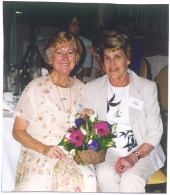
Marlene and Liesel discuss their historic court victories
Liesel was only awarded $85,000 but the legal precedent of a jury verdict in the NSW Supreme Court was invaluable to the cause of smokefree workplaces. By winning the case and showing that the NSW state government was guilty of not protecting workers' health, Liesel was directly instrumental in the immediate government action to ban smoking in all state government workplaces. This brought them belatedly into line with the Federal Government, which had gone smokefree in 1988 as a result of that other NSMA sponsored and financed case, Roy Bishop Vs Commonwealth Government.
Hence NSMA arranged door-to-door transport to bring Liesel to the dinner as an honoured guest. We sat her at the same table with Marlene and Peter Semmler, who had also been her barrister. They had much to discuss re the impact these cases had made on their lives but they were unanimous that the flow-on benefits to others fully justified their efforts.
NSMA encourage more action Vice President, Owen Graham, introduced the first speaker and President, Brian McBride, later reinforced NSMA policy of encouraging and supporting these kinds of individual legal actions. The audience could sympathise completely with Marlene's account because we all know of the tensions within our own families and friends when we take a stand on the smoking issue. To some you are a champion but to others you are dismissed as a little Hitler interfering with the "rights" of others. Out of this frustration and turmoil we can only take heart from the wholesale conversion of the community that occurs when the courts put the stamp of vindication on people like Marlene and Liesel. The courts finally give them justice, belated and inadequate though it surely is. There is no real joy in any plaintiff having to suffer life-threatening health damage in order to prove a point.
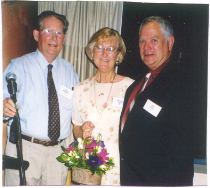
NSMA President, Brian McBride thanks Marlene and Bill Sharp
for their great contribution to the cause.
There is no adequate compensation for getting cancer through no fault of your own. The only real winners are the rest of the community who may be saved from a similar fate by the changes that are brought about as a result of the heroes and heroines who carry the burden in order to give victory to others. Therefore it is entirely appropriate that we make this small effort to thank people like Marlene and Liesel for their courage in fighting for a fundamental principle and to thank the legal team who made it happen through their expertise and professionalism. We want to encourage more people to take heart from these cases and to take their own legal action against anyone who inflicts tobacco related health damage upon them.
SMOKING IN FLATS & UNITS It has been reported that a county area, in the state of Maryland in the United States, now has a regulation which states that if people smoking cigarettes in their own home affect other people, they can complain about it. This has resulted in local talk back radio callers complaining about similar problems here in Australia. NSMA can confirm that there are indeed many people who suffer smoke invasion of their properties because of their neighbours smoking habits.
We are compiling a database of all people who contact us with a view to supporting some kind of legal action to redress the situation. We have some good ideas under discussion that can't be revealed as yet. Meanwhile we assure all those who have contacted us and particularly those who have since become members, that we will seek a solution to this very vexed question. We hope to report in more detail in the next newsletter.
PREVENTION IS BETTER THAN CURE One ounce of prevention is worth a ton of cure, as the old saying goes. Surely we should be doing more to make it very difficult for new smokers to even get started on the habit and stop wasting major funds on quit and cure programs after the damage is done. It is frustrating to see the Sydney Morning Herald devoting a whole page on 12 January 2002 to various aspects of controlling or ending the damage but without one word of support for what we should really be demanding. That is, a complete ban on public smoking.
The articles dealt with: - A new vaccine (Tanic) being tested in the UK, which combines nicotine with a protein, that results in the body producing an anti-body response which blocks any pleasurable effect in the brain. - The debate amongst anti smoking campaigners whether it is ethically acceptable to persuade smokers to reduce their number of cigarettes instead of planning to quit completely. That is, damage control as the objective not complete cure. - The futility felt by smokers who were unsuccessful in quitting in spite of repeated attempts. - The better healing after surgery for those who quit at least 6 weeks before the knife.
Given that many millions of smokers already exist there is a need for all these well-intentioned efforts to continue. However, there is a more pressing need to attack the fundamental problems in a society which makes it only too easy for young, ignorant, wet behind the ears smokers, to enter the cycle and keep the process going indefinitely.
NEW SMOKERS SHOULD BE LICENSED We intend to push on with demands for total bans on smoking in public but in the meantime we should push for new radical approaches such as insisting that all new smokers be licensed. This could operate just like the process for getting a driver's licence. The young person is issued with a handbook of all relevant information on the dangers and responsibilities which must be understood before they are let loose to interact with the rest of society. They must be thoroughly tested on their knowledge and fitness to undertake this new venture. If examination shows they are still ignorant or immature or physically unsuitable for the endeavour the licence should be denied until such time as they do comply.
A key step in the process is to sign an indemnity stating they are prepared to forego all taxpayer funded medical help for smoking related diseases, in the possible event that some future government will legislate along those lines. In the interim they accept that costs of medical help will be limited to the quarantined funding received by the government under the licensing fees scheme. Doctors would identify smoking related illness and be paid separately in the same way that workers compensation costs are separately identified.
They must pay an annual licence fee, which is high initially but scales down if and when the cost to taxpayers can be shown to reduce. The general scale of fees should be calculated to progressively replace the tax excise on cigarettes that the government is projected to receive, say in the next ten years. Such a scheme would be revenue neutral to the government. In fact it would be cost neutral to the smoker because the money would be paid as an annual fee instead of as a tax on each packet of cigarettes. More importantly, it would ensure that smokers meet the total cost of smoking damage and is not subsidised in any way by the rest of the community.
A really important benefit of such a scheme is that it would remove smoker's taxes from consolidated revenue and thus give us some hope of breaking the government's addiction to these funds. When smoker's taxes and costs are quarantined into a separate statutory fund, which is self-funding in the long term and revenue neutral to government, we might finally get some real action against the tobacco industry by the government.
After every smoker is licensed the police or other agencies right down to council inspectors should be empowered to demand production of a licence by any person found smoking in public. Failure to produce a current licence should result in an immediate on-the-spot fine. This would be a nice little revenue earner for councils to cover their incidental costs of cleaning up litter etc.
Only in the last twelve months the government introduced a new licensing requirement for recreational fishing. If they can do this as a revenue raising and conservation based project for something as innocent as "fishing", why not do it for the really dangerous and damaging problem of smoking?
If we weigh up the potential damages and losses of all kinds inflicted on society by both young drivers and young smokers; which is greatest? The facts are that smokers are a much greater risk to society. This is not to say that we should not license drivers but to prove that there is a compelling case for licensing smokers.
Consumer Distortion At Drug Stores Also consider that the top ten items purchased from supermarkets by Australian consumers last year were: Coca-Cola, Longbeach Cigarettes, Winfield Cigarettes, Peter Jackson Cigarettes, Horizon Cigarettes, Milk, Benson & Hedges, Huggies, Holiday Cigarettes, and Bread. Australians are spending $2.8 billion a year on Coca-Cola and cigarettes. This does not signal a healthy attitude to consumption in Australia. Millions are being spent on campaigns conducted by health departments and QUIT agencies to promote non-smoking but the message is not getting through.
The expense of cigarettes is not deterring smokers. The tax revenue on cigarette turnover keeps this as a star product for supermarkets. This is a very good reason to reduce the price to its true level, which would not justify supermarkets creating special displays and priority service counters for this deadly product. The tax revenue and cost to the smokers could be kept at the same level by making every smoker pay an annual licence fee calculated to raise the same amount. Perhaps then we will return supermarkets sales to reflect their true role instead of being glorified drug stores.
HOLLYWOOD PROMOTES SMOKING WITH AUSTRALIAN ACTRESS
While one great Australian actress died from smoking in October 2001 another one does not hesitate to promote smoking in her latest films.
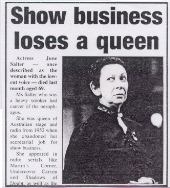
Australian Actress and heavy smoker,
June Salter, dies ages 69.
June Salter, once described as the actress with the low cut voice, died last year aged only 69. She was a heavy smoker and died from cancer of the oesophagus. In that same year Australian actress, Nicole Kidman, did so much smoking in her widely publicised films that she has been tagged "the new Marlboro man".

Australian actress Nicole Kidman continues Hollywood's
promotion of smoking in her films.
Hollywood and its actors are under scrutiny as to why there is more smoking by heroes in movies than by successful people in real life. Some smoking in the context of some scenes may be hard to avoid but it is so overdone now that there is only one explanation. The tobacco companies are getting at the stars with payola to promote their deadly product.
Anti smoking forces in Australia are working together in pursuit of Federal Government legislation requiring film credits to state that no benefit was received from the tobacco industry. The sooner this is done the better for our teenagers and other impressionable people who slavishly follow the fashions of their stars.
BUSHFIRES STARTED BY SMOKERS There can be little doubt that carelessly discarded cigarettes started some of the disastrous Xmas 2001 bushfires in NSW. When the bush and grass verges are so tinder dry and the land is preheated with scorching temperatures any source of ignition can trigger an inferno. We have all complained for years about smokers in cars throwing their butts anywhere without a second thought.
At last the Environmental Protection Agency (EPA) in NSW have taken the issue seriously and will investigate complaints from the public. If you see anyone throw a cigarette butt from a vehicle you should ring the number below and report the details. We are assured that if adequate information is given the EPA will definitely take some action against the offenders. Send copies of complaints to NSMA and we will follow up for you to see how well the system works.
ACTION POINT RE CIGARETTE BUTTS DISCARDED FROM VEHICLES - RING THE NSW EPA ON 131 555 AND REPORT DETAILS. Time, date and location observed. Include the registration number, colour and type of vehicle.
HARRY THE PRINCE OF POT Those close to Prince Charles's youngest son say " Of course Prince Harry experimented with Cannabis. He would have felt left out otherwise". Reports that the 17 year old has been smoking and drinking under age are a major disappointment at a time when you would expect that our best educated youth, going to the best schools, would have enough comparative advantage to avoid these pitfalls of adolescence. Do they really have to experiment with dangerous and illegal drugs to feel "in" with their peers?
Last year our Prime Minister announced a $24 million campaign package including a mail-out to 6 million Australian homes to teach parents how to talk to their children about illicit drugs. I wonder if Tony Blair had spent the equivalent money in communicating with all UK parents would it have made any difference either at the palace or down in Soho? I don't think so.
Public Smoking Is Bad Example To Children The mistake with tobacco and cannabis right around the globe is to continue to accept it as a "normal public practice" for adults and therefore only a naughty prank for juniors. The answer is to get serious about making it abnormal behaviour. We should teach children to be just as horrified to see someone put a cigarette in their mouth, as to see someone sticking a needle in their arm. To achieve this and look serious to our children we have to ban all public smoking of any substance legal or illegal.
We should not flinch at demanding this, and we should use the additional justification of protecting our personal air space as sacrosanct. Even a nice simple-to-enforce law making it an offence to smoke within, say, 5 metres of any other person in a public place would almost do the job for us. The emphasis would be on protecting the non-user in public rather than restricting the user's rights. Public prohibition coupled with private permission is the intermediate step towards a smoke-free Australia. The final push for public bans may well have to rely on the "proper education of children" as much as the "public health" argument.
SMOKING IN CITY DOORWAYS One large city firm has been forced by its occupational health and safety committee to take issue with the owner of the building about the health risks of daily exposure to tobacco smoke around the entrance doorways. They quite rightly say that workers are forced to make their way through a haze of passive smoke and it is a legitimate health issue.
The owners of the building tried for three months to bury it in the "too hard" basket but when finally forced to respond they said:
"The front door is open to fresh air and is part of a public thoroughfare. Therefore it is difficult for the building management to designate this as non-smoking. We have taken measures to move the ashtrays from the front of the building down to the southern corner. In an effort to stop tobacco smoke blowing back into the lobby. We would point out that once personnel are outside the property it is not within our power to direct where people may smoke and we shall have to rely on people's goodwill to refrain from smoking directly outside the front door."
NSMA have been asked for advice in taking this fight a step further and we will be happy to oblige. More details will be given in the next Update.
Another Win in USA In December 2001 a Florida, USA, jury awarded $165,000 to a 50- year smoker who claimed the second biggest U.S. tobacco company, R J Reynolds, is responsible for his lung cancer. While it is a loss for the tobacco company, the award falls short of other sizeable verdicts in Florida and on the West Coast. The tobacco industry has not had much recent success in Florida state courts, where in July 2000, a Miami jury ordered the industry to pay $145 billion to a class of Florida smokers. Lawyers for the Winston-Salem, North Carolina-based company had argued in this case that it should not have to pay Floyd Kenyon 73, a retired schoolteacher who blames R.J. Reynolds for his lung cancer and breathing disorder.
Kenyon's lawyers successfully told jurors in closing arguments that the company made a defective product and failed to warn smokers about the risks of smoking their cigarettes. R.J. Reynolds, the only defendant in this case, said it will challenge the award.
WORLD HEALTH ORGANISATION ACTS The World Health Organisation has accused the tobacco industry of trying to deter governments from trying to ban tobacco advertising; the WHO is trying to negotiate an international ban on tobacco advertising defining it as a communicated disease - communicated by advertising. The WHO is particularly concerned about tobacco advertising associated with national and international sport.
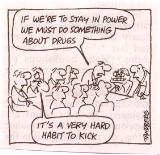
For the triumph of evil it is only necessary
for good men to do nothing - Edmund Burhe.
BUT KEEP FINGERS CROSSED The World Governing Body of Motor Sport has confirmed that tobacco advertising and sponsorship won't be allowed internationally from 2006.
ONLY 360,000 AUSSIE KIDS SMOKING! New figures show that more people are dying from smoking than ever before even though overall deaths from cancer have dropped. Cigarettes are blamed for 21 per cent of all cancer deaths. Anne Jones has been on the media again pointing out that there are 360,000 kids who smoked in the last week and 100,000 of these are taking it up each year. There are not enough messages in the community warning of the health problems. It is disgraceful that these new figures show NSW high school students are puffing their way through 100 million cigarettes a year worth around $36m.
SMOKERS' SENSE OF 'GUILT' AND 'FUTILITY' Smokers with lung cancer feel guilty about their diagnosis and many fail to seek treatment according to The Cancer Council of NSW, which says doctors are also failing to properly treat people diagnosed with the disease. "There is enormous pessimism in relation to lung cancer," says, Dr Andrew Penman. "It is of great concern that people diagnosed with the disease are not surviving as long as they should because they are simply not receiving the best treatment. "Smokers tend to blame themselves for developing lung cancer and many don't seek proper treatment because they think it's futile. There's also a sense of futility among some doctors who feel there's little they can do to treat people with the disease," he said.
GOOD NEWS FROM OVERSEAS The latest newsletter from Americans For Non Smokers' Rights (ANR) gives a long list of more and more local Counties enacting clean indoor air ordinances. In addition more states are introducing bans on a broader scale. Unfortunately the long awaited Federal laws to cover all workplaces is still being held up by the entrenched political interests of the tobacco industry
LEAVE A BEQUEST TO NSMA IN YOUR WILL. MANY PEOPLE LEAVE MONEY TO AGENCIES WHICH ALREADY RECEIVE GOVERNMENT PLUS SUBSTANTIAL CHARITY FUNDS. OUR ACTIVE ANTI SMOKING WORK HAS NEVER RECEIVED ONE DOLLAR OF GOVERNMENT SUPPORT AND WE RELY ENTIRELY ON THE GENEROSITY OF MEMBERS. YOU CAN ENSURE THAT THE GOOD FRONTLINE WORK WILL CONTINUE BY REMEMBERING NSMA IN YOUR WILL. Please contact us if you need assistance with bequest procedures.
BAD NEWS FROM OVERSEAS- THE TOBACCO SETTLEMENT Some states involved in the Master Settlement Agreement with tobacco companies are spending the money they received from the settlement for other purposes. The settlement came at an opportune time for some states that had financial troubles. In the 2002 fiscal year, only 1 dollar in 20 of the settlement money will be spent on smoking cessation programs. The Centres for Disease Control has recommended that states use 20-25% of their settlement on tobacco control programs, but only six states spent this recommended amount last year.
EARLY NOTICE OF 25 TH ANNIVERSARY DINNER October 2002 will mark the 25 th anniversary of the formation of the Non Smokers' Movement of Australia. No date is set at this stage but should be advised in the next Update at the end of April. If you know anyone who was a member in the early years but has lost contact with us please let us know. Of course you should make a diary note that you will come along to make this our biggest celebration dinner yet.
FRAMEWORK CONVENTION ON TOBACCO CONTROL. The world watches while the World Health Organisation (WHO) convenes meetings around the globe with a view to establishing an international treaty on tobacco control. The bulletin of the International Non Government Coalition Against Tobacco (INGCAT) reports that a uniform approach is not to be expected. Nations with different interests can be divided into three groups.
1. A small group of high income countries , like USA and UK, who will support limited moves of doubtful value, such as bans on ads to under 18's etc. They will claim to be pragmatic trying to get wide consensus. However pragmatism is a convenient cloak for those who do not wish to take meaningful action while giving the impression they are supportive.
2. Countries that support measures already in place in their jurisdictions and do not want a treaty which will make them go further. Some European countries like Germany are in this group.
3. States that support a scientifically based treaty incorporating international best practice. This large group consists of mainly low-income and middle- income countries that are the main targets of tobacco industry expansion. For better or for worse the decisions taken in Geneva will have an important long-term impact on tobacco control.
The Non-Smokers' Update is the quarterly newsletter published for members of the Non-Smokers' Movement of Australia Inc.. Contributions or comments should be forwarded to the editor, Brian McBride, at the address shown on the front cover.
 The Non Smokers' Movement of Australia - 2002-2007.
The Non Smokers' Movement of Australia - 2002-2007.
